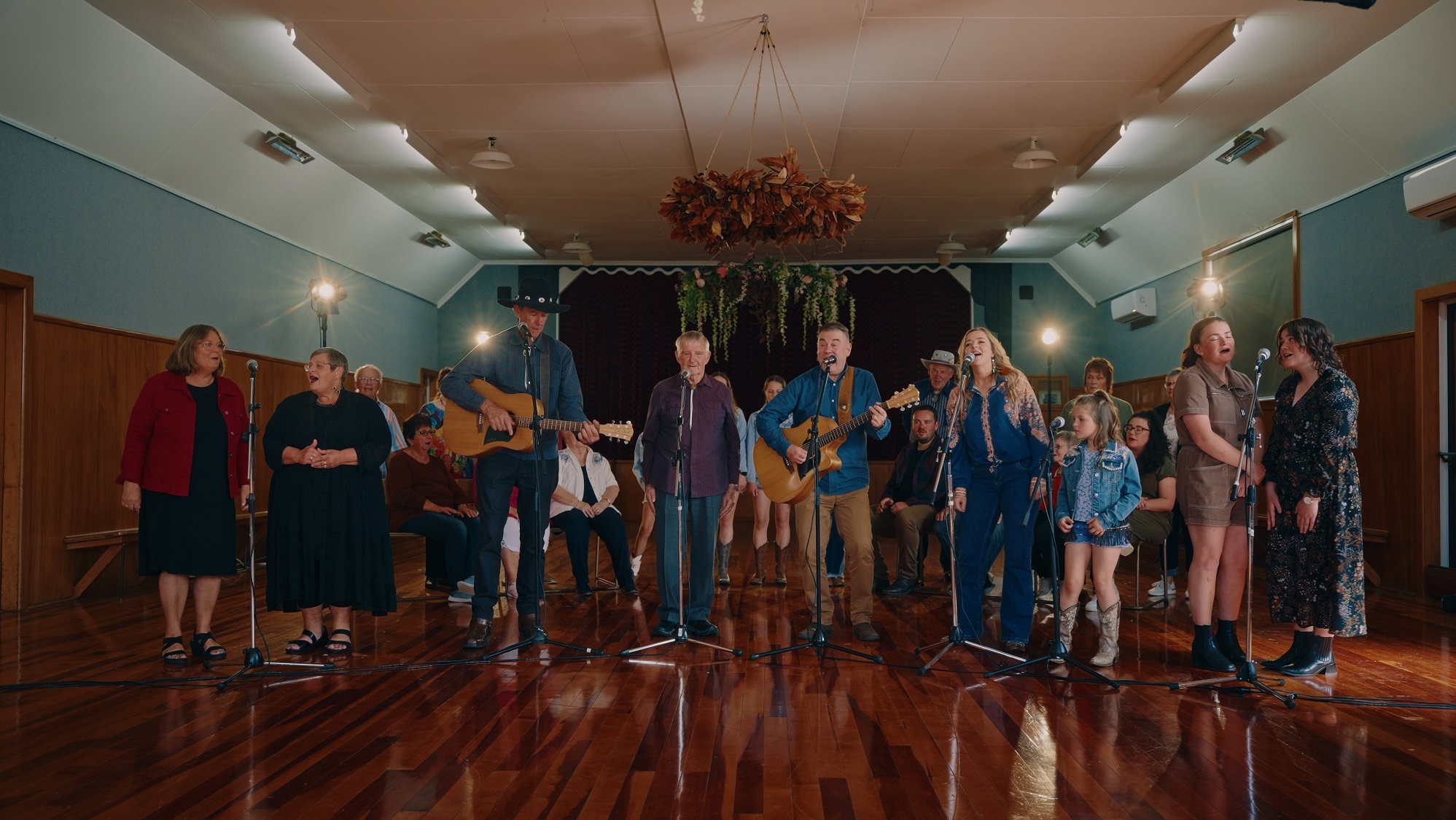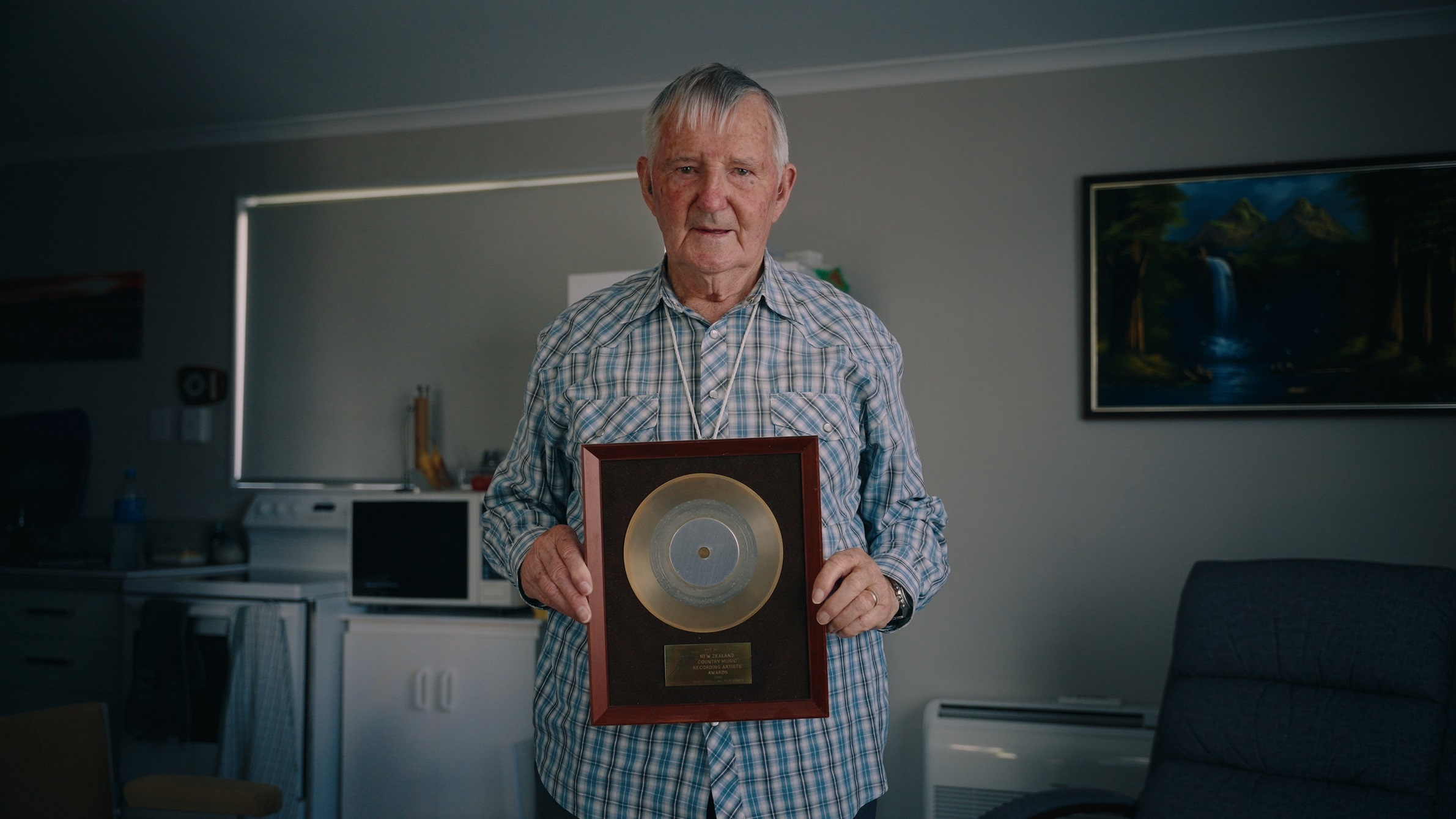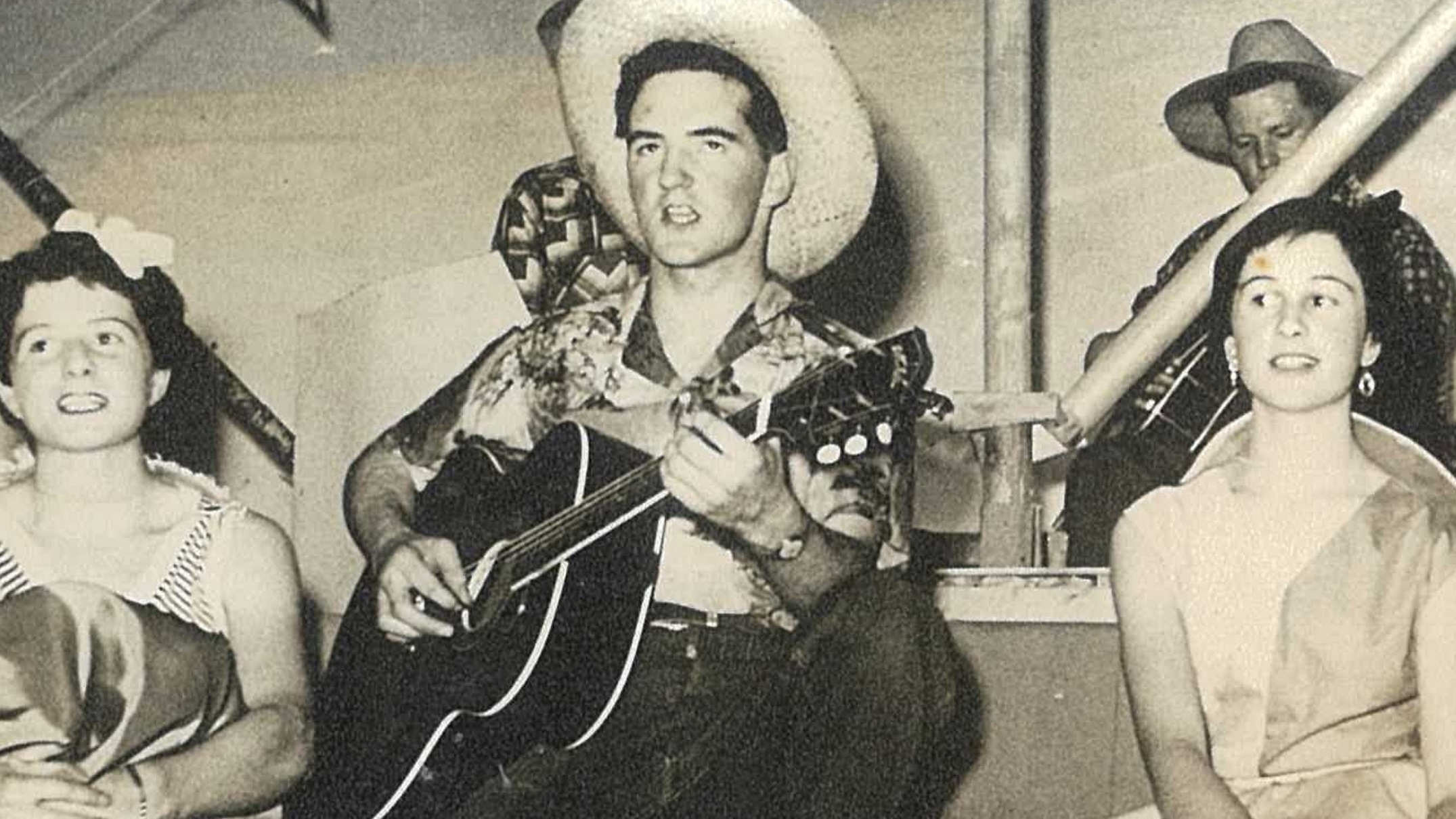
When the clubrooms of the Gore Country Music Club needed a new kitchen, back in the day, one of the members simply stopped work on their own home kitchen renovation and bought one for the club instead.
In the context of a new documentary about the club’s first half-century — Capital of Country Music: 50 Years of the Gore Country Music Club — it makes perfect sense. There are any number of examples of people putting the club and community first and volunteering their time, talents or resources.
On another occasion, club legend Jessie McChlery Tytler put up the money to battle through a contested resource-consent process for Gore’s country music monument — the Hands of Fame.
At the time, some people suggested what she really needed was a new car. But she was in no doubt about priorities.
There was clearly something quite remarkable going on in the eastern Southland town. Yes, people once volunteered their time — and resources — to all manner of enterprises without a second thought. But the Gore Country Music Club took it to the next level. Among the proof is that the club endures.
Early in the documentary, Eastern Southland Gallery curator Jim Geddes, a Gore man to his core, recalls a comment about the club made by country music hero, the late Dusty Spittle: "Country music is working people’s music and places like this are built by working people, so it’s their celebration of their place."
The Gore Country Music Club is what happens when people who are used to rolling up their sleeves and getting the job done, do just that, Geddes says.
It was these unique and special qualities that another Gore local, and country music singer-songwriter, Jenny Mitchell, wanted to capture in her first outing as a documentary maker.
Capital of Country Music, made in collaboration with Dunedin film-makers Wade McClelland and Bradon McCaughey, of Scrambler, will have its premiere on Thursday as part of the Tussock Country music festival, at Gore’s St James Theatre.
Mitchell expects it to be quite an event, most likely sold out, as the people behind the club get to see themselves on the big screen.
"That’s what we, Scrambler and I, are most looking forward to, is sitting there and watching everybody see themselves. That will be quite emotional," she says.
Befitting the inclusive ethos of the club, the documentary has a sprawling cast of characters — committee stalwarts, longtime club members and musicians — sharing their stories, which fall almost equally between a love of country music and an appreciation for the sense of community the club has provided.
Dame Lynda Topp, of Topp Twins fame, provides one such story, from the occasion of the duo’s first visit south to the Gold Guitars.
"There was just this incredible audience," she says in the documentary.
"I can remember the whole back row, the whole two back rows I think, were knitting. You know, these old girls and they had their bags with them and they pulled their wool out ..."
It was a homespun manifestation of the way in which the music festival was broadly supported by the town, and cast in its own image.
"That was a bit of an eye opener," Dame Lynda says.
The story about the donated kitchen is one of Mitchell’s favourites.
"It just shows how much they felt that it was their place. I think that is interesting. Like, it doesn’t matter whether the kitchen is there [at the club] or at their house, because they are going to get the benefit out of it," she says.

The organisers called themselves Country Style Promotions and included the likes of Max McCauley and Dusty Spittle, men who were to become giants of the country music scene — the former’s 1978 record 20 Golden Yodels sold more than 50,000 copies, while the latter recorded on both sides of the Tasman.
They soon decided Gore needed its own country music club, and called a public meeting at the coffee lounge. It was 1972, the turnout took even its organisers by surprise, and the Gore Country Music Club was born.
Mitchell began her work on the documentary to coincide with the club’s 50th anniversary celebrations, a couple of years ago, as it brought a lot of people back to town, and its screening this year aligns with the 50th anniversary of the first Gold Guitar Awards.
"I have been a club member my whole life and that was where I started performing," she says. "So, I sort of had all these stories handed down to me, I guess, of people, you know, like, the late Jessie."
And the half-century milestones the club is racking up means many of the people involved have long since swapped gold records for gold cards.
"I thought it was really important to preserve those stories, somehow. People like Max McCauley, they’ve had such incredible success and adventures with music.
"I just thought about, how can we best tell that? And it obviously felt right to have it come from them.
"So, I wrote a letter to the board and talked to them about it. And I think they initially were like, ‘what is Jenny talking about now?’. But once they got the got the gist of it, I think they have enjoyed it. Many of them, you know, have never been on screen before and never been interviewed before. So that part of it has been a real privilege, to be able to help them, hopefully, feel comfortable and to tell their story."
The film is a tribute, a love letter — a big screen autograph book of signatures.
The list of people Mitchell wanted to celebrate was long, but she mentions Peter Cairns in particular — another Gold Guitar winner, club past president and life member. A man who has played a big part as a musician, mentor and music teacher.
In the documentary he talks about what it means to him to see the people he has coached succeed — Mitchell is one. His passion is palpable, his memory clearly alive with a thousand golden moments set to music.
"Hearing that is another part that always makes me cry," Mitchell says. "When he’s talking about how that feels to have put in all that work with people of all ages. That it’s a big emotional thing for him as well. I think the respect and the commitment that he has is pretty amazing. So it was really fun to get to interview him and honour him in that way."
Community was the thing that those interviews kept coming back to, she says.
Among others who made the final edit — and not everyone did, as they shot 65 hours of interviews — is Mitchell’s father, Ron, who makes the point that it is actually a fairly small percentage of club members who ever take to the stage.
But there’s a place for everyone, Mitchell points out, as some effectively learn to be event managers or stage managers, others sound or lighting engineers, while many are content to concentrate on listening, supporting, sharing in community — and maybe doing some line dancing.
The club’s role in bringing people together has a particular importance for rural communities, she says, and also for older communities.
"A lot of those people live alone."
In the process, Mitchell says, that collective effort has allowed individuals to blossom. It strikes her, as someone who has come up through the Gold Guitar Awards — and won it — and benefitted from it, that it wasn’t music industry people who had created that opportunity.
"They were just passionate, and they were ready to volunteer. So, when I think about people like Kaylee Bell, who is just taking over the world, and artists like that, who have won, who have benefitted from that platform, it’s very humbling."
Which is not to say the club has been universally supported. Not everyone in Gore is entirely enamoured of country music. There’s that contested resource consent for the Hands of Fame monument, for a start, that once cost Jessie McChlery Tytler a new car.
That particular chapter played out before Mitchell was aware of town politics but it underlines for her the mettle of the club members.

Mitchell hopes the benefits that the club and its music festival have brought to the town are now widely appreciated.
"When the festival starts there are more than 10,000 people who come within the week. And, obviously, that brings great gain to the community in lots of ways. So, I think, more and more people are starting to see the value and recognise the foundations of it, and how far it’s come."
The festival wrapped around the Gold Guitar Awards, Tussock Country, will this year include visits to rest homes and a preschool show and a cheese-roll workshop.
"If you want to celebrate Gore by making a cheese roll, you can do that. Or you can go to Gold Guitars. It feels like there really is something for everybody now, which I think is awesome."
But if anyone were considering dipping their toes into country music, now might be the time. It may never have been cooler.
Beyonce has just made a country record, closer to home Tami Neilson and Marlon Williams have put country music centre stage, and homegrown singer-songwriter and former Gold Guitar winner Bell is ripping it up in the United States.
"Well, I just put some petrol in my car and Kaylee Bell was playing at BP," Mitchell says. "So it’s pretty surreal, things like that."
Back when Bell won the Gold Guitar, aged 18, there was little or no country music on the radio at all, she says.
"And now you hear it all the time. So that is really exciting. And Australasia, it’s one of the quickest growing music markets."
People are beginning to appreciate its diversity.
"It is super exciting for Gore and for the future. But also, as an artist, it’s really cool, there are a lot of people walking around wearing hats and boots now that I didn’t think would ever do that."
The very grounded themes in the music of McClaughley and Spittle, about working the land, spoke to people in Gore, Mitchell says. But, equally, Tami Nielson’s songs about being a woman and being a mum and the challenges that come with it in 2024, connect to people’s lived lives.
"It’s the same thing. People relate to that. So that’s what country music has always been. And I think now maybe, you know, it doesn’t matter whether you live on a farm or not, there’s a country song that you can relate to."
If Mitchell has a particular purpose for her documentary beyond celebrating the work of the past 50 years, it’s to flag the opportunity to be involved in the next 50.
Several of the club stalwarts interviewed highlight the growing difficulty of attracting volunteers, to help out, to staff committees.
"I hope that people will watch who maybe are involved in some way, like maybe their kids enter Gold Guitars, or they enter Gold Guitars, but they haven’t thought about how they can give back in a different way."
Maybe the documentary will highlight a place where they could contribute.
"I think that was one of my main takeaways. We have to find a way to share the load and not just reap the benefit of getting to play at Gold Guitars and sing on a big stage. It’s really about how do we protect that?"
Mitchell’s own passion for the club and the Gold Guitars is undimmed.
"It’s just so much about seeing those people," she says of all those who flood into town during festival week.
"That feels sort of like Christmas."
The screening
• Capital of Country Music world premiere at the SBS St James Theatre, Gore, Thursday at 7pm.
• For further viewing opportunities watch the Facebook page.











